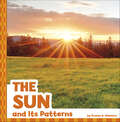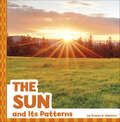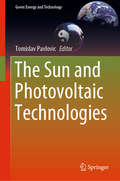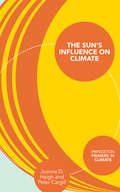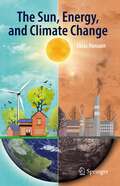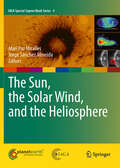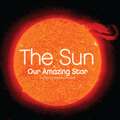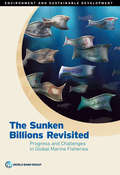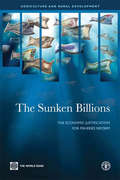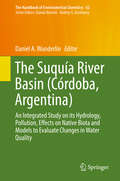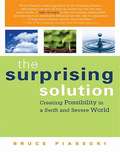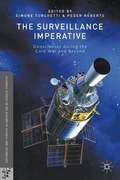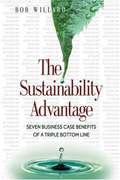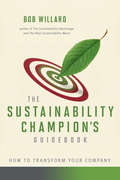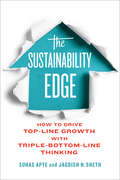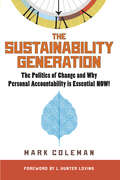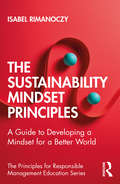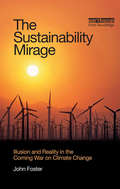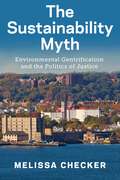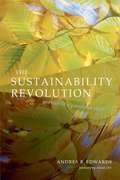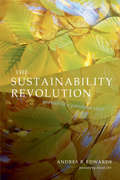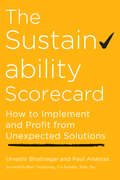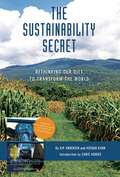- Table View
- List View
The Sun and Its Patterns (Patterns in the Sky)
by Thomas K. AdamsonWhat is the sun? Why do we have seasons? What are eclipses? Learn the answers to these questions and more in this easy-to-read title and discover the science behind the sun and its patterns.
The Sun and Its Patterns (Patterns in the Sky)
by Thomas K. AdamsonWhat is the sun? Why do we have seasons? What are eclipses? Learn the answers to these questions and more in this easy-to-read title and discover the science behind the sun and its patterns.
The Sun and Photovoltaic Technologies (Green Energy and Technology)
by Tomislav PavlovicThis book covers solar energy and the use of solar radiation in connection with lighting. It provides a detailed introduction to solar energy, photovoltaic (PV) solar energy conversion, and solar lighting technologies, while also discussing all of these elements in the context of the Balkan Peninsula. In the context of solar energy, the book covers a range of elements, from the structure of the sun, to PV solar plants. It subsequently addresses the status quo of solar technologies in Bulgaria, Serbia and the Republika Srpska and analyses the development of these technologies over the years, including their economic status, and how these aspects have shaped their current status. Undergraduate and graduate students, researchers and professionals, particularly those based in the Balkans, will find this book both informative and interesting.
The Sun and the Moon (Let's-Read-and-Find-Out Science 1)
by Carolyn Cinami DeCristofanoRead and find out about the sun and the moon in this colorfully illustrated nonfiction picture book.The sun is out in the day and always has a circle shape. The moon’s shape seems to change, and you can sometimes see it in the daytime and at night. What are the sun and the moon? How are they the same and how do they differ? Hop into your spaceship and find out!With beautiful illustrations and engaging text, The Sun and the Moon guides young readers into a deeper understanding of their observations of the sun and the moon. Featuring a find-out-more section with instructions on how to keep an observation log and how to make moon ice, a glossary of new terms, and web research prompts, this book will begin children’s explorations of the sun and the moon.Recommended by Brightly as a favorite book for kids about astronomy: "This book even has a glossary and science experiments to offer kids a hands-on learning experience." Both the text and the artwork were vetted for accuracy by Bradley J. Thomson, Ph.D., Senior Research Scientist at the Boston University Center for Remote Sensing. This is a clear and appealing science book for early elementary age kids, both at home and in the classroom. It's a Level 1 Let's-Read-and-Find-Out, which means the book explores introductory concepts perfect for children in the primary grades. The 100+ titles in this leading nonfiction series are:hands-on and visualacclaimed and trustedgreat for classroomsTop 10 reasons to love LRFOs:Entertain and educate at the same timeHave appealing, child-centered topicsDevelopmentally appropriate for emerging readersFocused; answering questions instead of using survey approachEmploy engaging picture book quality illustrationsUse simple charts and graphics to improve visual literacy skillsFeature hands-on activities to engage young scientistsMeet national science education standardsWritten/illustrated by award-winning authors/illustrators & vetted by an expert in the fieldOver 130 titles in print, meeting a wide range of kids' scientific interestsBooks in this series support the Common Core Learning Standards, Next Generation Science Standards, and the Science, Technology, Engineering, and Math (STEM) standards. Let's-Read-and-Find-Out is the winner of the American Association for the Advancement of Science/Subaru Science Books & Films Prize for Outstanding Science Series.
The Sun's Influence on Climate
by Peter Cargill Joanna D. HaighThe Earth's climate system depends entirely on the Sun for its energy. Solar radiation warms the atmosphere and is fundamental to atmospheric composition, while the distribution of solar heating across the planet produces global wind patterns and contributes to the formation of clouds, storms, and rainfall. The Sun's Influence on Climate provides an unparalleled introduction to this vitally important relationship.This accessible primer covers the basic properties of the Earth's climate system, the structure and behavior of the Sun, and the absorption of solar radiation in the atmosphere. It explains how solar activity varies and how these variations affect the Earth's environment, from long-term paleoclimate effects to century timescales in the context of human-induced climate change, and from signals of the 11-year sunspot cycle to the impacts of solar emissions on space weather in our planet's upper atmosphere.Written by two of the leading authorities on the subject, The Sun's Influence on Climate is an essential primer for students and nonspecialists alike.
The Sun, Energy, and Climate Change
by Eklas HossainThe Sun, Energy, and Climate Change conveys one central idea – that we can utilize energy without continuing to harm the planet by increasing our reliance on energy from the sun. This accessible guide stresses the sun’s importance as our ultimate energy source by focusing on climate change from an energy perspective and explains the naturally balanced energy transfer from the sun to the earth and society’s consumption of this energy. This book is for anyone worried about environmental damage from our reliance on fossil fuels and the global fight against climate change. The key message being we do not have to accept the inevitable and can work to prevent the worst.
The Sun, the Solar Wind, and the Heliosphere
by Jorge Sánchez Almeida Mari Paz MirallesThis volume represents the state of the art of the science covered by the International Association of Geomagnetism and Aeronomy (IAGA) Division IV: Solar Wind and Interplanetary Field. It contains a collection of contributions by top experts addressing and reviewing a variety of topics included under the umbrella of the division. It covers subjects that extend from the interior of the Sun to the heliopause, and from the study of physical processes in the Sun and the solar wind plasma to space weather forecasts. The book is organized in 6 parts: the solar interior, the solar atmosphere, the heliosphere, heliophysical processes, radio emissions, and coordinated science in the Sun-Earth system. In addition, we highlight some of the results presented during the IAGA Division IV symposia in the 11th Scientific Assembly of IAGA in Sopron, Hungary, on 23-30 August 2009, which was planned simultaneously with this book.
The Sun: Our Amazing Star (Penguin Core Concepts Ser.)
by Patricia Brennan DemuthBlast off and explore the star of our solar system—the Sun!Billions of stars fill the universe. But for humans, the most important star is the one closest to Earth—the Sun. From vitamin D to solar energy, the Sun provides the power necessary to sustain life on our planet. And as the center of our solar system, the strong gravitational pull from this ball of burning gas keeps all the planets in orbit. Discover the significance of the Sun and its brilliant blaze in this fascinating book!
The Sunken Billions Revisited: Progress and Challenges in Global Marine Fisheries
by World BankThis report updates previous studies that measured in economic terms the extent of biological losses attributable to overfishing globally. The new estimates assess these 'sunken billions' at $83 billion annually. The report further shows that a clear path can lead to the recovery of these considerable losses, including through significant reduction in global fishing overcapacity. A breakdown between regions is also included, showing that the effort needed to achieve this reform will not be felt equally throughout the world. While the cost of such reform will likely be high, the expected benefits include an increase in biomass by a factor of 2.7, increase in annual harvests by 13 percent, and a 30-fold increase in annual net benefits accrued to the fisheries sector (from $3 billion to $86 billion annually). This urgent call for action is reinforced by the impacts of climate change on fish stocks and fisheries worldwide.
The Sunken Billions: The Economic Justification for Fisheries Reform
by Kieran Kelleher Rolf Willmann Ragnar Arnason'The Sunken Billions: The Economic Justification for Fisheries Reform' shows the difference between the potential and actual net economic benefits from marine fisheries is about $50 billion per year, or some $2 trillion over the last three decades. If fish stocks were rebuilt, the current marine catch could be achieved with approximately half the current global fishing effort. This illustrates the massive overcapacity of the global fleet. The excess competition for the limited fish resources results in declining productivity, economic inefficiency, and depressed fisher incomes. The focus on the deteriorating biological health of world fisheries has tended to obscure their equally critical economic health. Achieving sustainable fisheries presents challenges not only of biology and ecology, but also of managing political and economic processes and replacing pernicious incentives with those that foster improved governance and responsible stewardship. Improved governance of marine fisheries could regain a substantial part of this annual economic loss and contribute to economic growth. Fisheries governance reform is a long-term process requiring political will and consensus vision, built through broad stakeholder dialogue. Reforms will require investment in good governance, including strengthening marine tenure systems and reducing illegal fishing and harmful subsidies. Realizing the potential economic benefits of fisheries means reducing fishing effort and capacity. To offset the associated social adjustment costs, successful reforms should provide for social safety nets and alternative economic opportunities for affected communities.
The Suquía River Basin (Córdoba, Argentina)
by Daniel A. WunderlinThis book covers all relevant aspects involved in conducting water quality surveys of rivers. Focusing on the Suquía River (Argentina), it starts with a description of its hydrology and hydraulics before discussing the spatial and temporal changes in its water quality. A short chapter is dedicated to its limnology and particular characteristics due to the presence of a constructed dam and reservoir. Further chapters explore the changes in native biota inhabiting the river basin and assess various physical, chemical and microbiological parameters, as well as organic pollutants, metals and metalloids resulting from human activities. The book closes with a chapter providing an integrated approach to surveying river water quality, focusing on methods for data mining, from the simple use of water quality indexes to more formal mathematical-statistical methods (chemometrics) for evaluating changes in water quality. The book offers an invaluable reference guide for all environmental managers and scientists involved in water resources, their quality and management.
The Surprising Solution
by Bruce PiaseckiThe Surprising Solution describes the revolution in business in which the corporations that can best address environmental and social issues by creating superior products will thrive and profit in this new world.
The Surveillance Imperative
by Simone Turchetti Peder RobertsSurveillance is a key notion for understanding power and control in the modern world, but it has been curiously neglected by historians of science and technology. Using the overarching concept of the "surveillance imperative," this collection of essays offers a new window on the evolution of the environmental sciences during and after the Cold War.
The Sustainability Advantage: Seven Business Case Benefits of a Triple Bottom Line
by Bob WillardCorporations are under increasing pressure from customers, investors, employees, legislators, banks, and insurance companies to embrace social and environmental responsibility. But Wall Street demands quarterly results, a stringent return on investment, and a short payback period. Up until now, there's been very little evidence expressed in business language showing the benefits of the "triple bottom line" relevant to the short- and long-term priorities of senior executives. So how can these seemingly incompatible goals be accomplished at the same time? Written in the pragmatic language of business leaders by a senior executive at Big Blue,The Sustainability Advantageshows that the business benefits of sustainable development strategies are quantifiable and real-and executives do not have to be tree-hugging environmental activists to reap these benefits. Each of the seven sustainability strategies presented in this practical guide are easy to grasp, yet powerful enough to lead to significant business opportunities, from reducing hiring and retention costs and improving productivity, to decreasing expenses and increasing revenue and shareholder value. Executives will especially appreciate a unique spreadsheet into which they can insert their own data to see for themselves whether the business case for sustainable initiatives is a profitable one for their company. Marketing Plans: * Ads inGreenMoney Journal, LOHAS Journal, Business Ethics * National print review campaign * National radio interviews * Web publicity on greenbiz. com and others * Direct mail to members of The World Business Council on Sustainable Development * Course adoption campaign Bob Willardrecently retired from his senior executive position at IBM to pursue his commitment to sustainable development full-time. Over his 35 years at IBM, Willard was recognized with numerous awards for outstanding leadership, HR development, marketing and sales. He lives in Ontario, Canada. Also Available Cannibals with Forks: The Triple Bottom Line of 21st Century Business TP $21. 95, 0-86571-392-8 * USA
The Sustainability Champion's Guidebook
by Bob Willard"Canadian sustainability expert Bob Willard, whp spent 34 years with IBM, offers a punchy, practical guide to leading change in your company in The Sustainability Champion's Guidebook. He presents a seven-step model of change, seven practices that sustainability champions in companies must follow, seven paradoxes they will face, and seven "derailers" to avoid. If you're interested in becoming a champion for sustainability in your company, this would offer useful guidance." - Harvey Schachter, The Globe and MailThis practical, easy-to-follow guidebook helps sustainability champions at any level in a company lead a transformation to a smarter, more successful, and more sustainable enterprise. The Sustainability Champion's Guidebook outlines the transformational steps to take, tips and techniques to use, and derailers to avoid.Bob Willard's previous books provide a financially relevant, compelling business case outlining why smart business executives should embrace sustainability. An expert on leadership, culture change, and organizational development, Willard distills lessons learned about cultural transformation and provides guidance on how to embed sustainability into corporate cultures.This guidebook is exceptionally easy to use, read, and consult. Each tip is self-contained within two facing pages. A change tip is presented on one page with a supporting sidebar or figure on its opposite, facing page. It is organized around four frameworks for easy reference: A seven-step sustainability change process Seven leadership practices to use during the change process Seven paradoxes that compliment the seven leadership practices Seven derailers to avoid This book is an indispensable tool for sustainability champions who are transforming their companies into more sustainable enterprises.Bob Willard uses his senior management experience from his thirty-four-year career at IBM to create a business case for corporate sustainability strategies. He has delivered hundreds of keynote presentations on the subject to corporations, consultants, academics, and NGOs worldwide. His two highly-acclaimed books, The Sustainability Advantage and The Business Case for Sustainability, are also available through New Society Publishers.
The Sustainability Edge: How to Drive Top-Line Growth with Triple-Bottom-Line Thinking
by Philip Kotler Jagdish Sheth Bob Willard Suhas ApteBusiness leaders need to embrace sustainability in order to ensure the lasting success of their organizations. Co-authors Suhas Apte and Jagdish Sheth bring their expertise from practice and from academic to illustrate how business leaders can embed sustainability in a truly holistic and transformative way. Through an examination of such companies as Walmart, AT&T, IKEA and the Tata Group, Apte and Sheth have developed a proven and actionable framework rooted in the real world success of these companies. The case studies reveal how business leaders proactively engage, energize and promote market sustainability to all of their stakeholders including customers, employees, suppliers, investors and the government. The Sustainability Edge enables companies to critically engage their stakeholders and influence them to accept sustainability as part of their core mission.
The Sustainability Generation
by Mark C. ColemanLife on Earth is increasingly at risk. What to do about rescuing our planet, and ourselves, is a growing concern for people of all ages and all walks of life. Mark C. Coleman's groundbreaking book, The Sustainability Generation: The Politics of Change and Why Personal Accountability is Essential NOW! takes a cold, hard look at the facts about where we stand and how to move forward. The Sustainability Generation is beyond simply another "green" book in that it focuses on the poisonous influence of our acquisitive culture and its root cause --entitlement. Our culture of entitlement encourages the belief that instant gratification is our right; this in turn erodes our sense of duty toward anything outside of these immediate desires. Our consumption habits are out of control and they are sabotaging our destiny. In response to this, Mr. Coleman argues that nurturing our sense of personal responsibility, and squashing our hunger for more "stuff" is the single most important step toward saving our world for future generations. The "Baby Boomer" generation is retiring and the so-called "Generation Y" will soon receive the largest transfer of wealth in history. It is vital to emphasize the need for replacing our entitlement culture with sustainable growth through redefining our core values. The Sustainability Generation provides a clear roadmap of how individuals can empower and enlighten themselves and their peers. A new "Sustainability Generation" that is committed to environmental and social change will offer the promise of the greatest legacy possible--a future!
The Sustainability Mindset Principles: A Guide to Developing a Mindset for a Better World (The Principles for Responsible Management Education Series)
by Isabel RimanoczyAs we increase our awareness of the planetary challenges and how they intersect with the discipline or profession we choose to focus on, we have put our attention on the external forces and impacts. What remains untouched however is the set of beliefs, values, assumptions, mental processes, and paradigms that we hold and share: our mindset. But how do we change a mindset? This book is the first to introduce the 12 Principles for a Sustainability Mindset, presenting educators with a framework that makes it easy to include them into teaching plans and lessons of any discipline. Written in a very clear and practical way, the book provides examples, checklists, tips, and tools for professionals and educators. It transforms the development of a much-needed mindset for sustainability into an accessible, fun and intuitive task. The book is written with educators from a variety of disciplines in mind, including but not limited to management educators, coaches, and trainers. No other book comes close to providing such a well-organized and solid way of starting to shift our mindsets in the direction of sustainability.
The Sustainability Mirage: Illusion and Reality in the Coming War on Climate Change
by John Michael Foster?This thoughtful and original study throws important critical light on the dominant orthodoxies about sustainable development, and suggests a radically new direction. Foster argues compellingly that present approaches embody floating standards and bad faith, trapping societies into inaction. I suspect this is a seminal piece of work.? Professor Robin Grove-White, former Chair of Greenpeace UK ?We all have a nagging concern that what international corporations and governments term 'sustainable' is not sustainable at all. John Foster?s clear and beautifully written text shows the deep flaws in current approaches and proposes a reassessment of what true sustainability really implies.? Chris Goodall, Chair of Dynmark International and author of How to Live a Low-Carbon Life ?This comprehensive and yet very readable book will go a long way towards puncturing some of the glib environmentalisms of our moment, and perhaps towards helping us imagine deeper and more thoroughgoing alternatives that might actually work!? Bill McKibben, author of Deep Economy and The End of Nature 'Brilliantly and ironically written, this book shades a bright light on most foggy areas around the concept of sustainability. Those fastidious obscure points do not fit properly in the reassuring technical solutions to Climate Change. Foster puts a name on those shapeless shadows that inevitably induce the sensation of something being wrong.' Italian Insider Sustainable development thinking got environmental issues onto the agenda but it may now be stopping us from taking serious action on climate change and other crucial planetary issues. Sustainable development?s attempted deal between present and future will always collapse under the pressure of ?now? because the needs of the present always win out. Inevitably, this means movable targets and action that will always fall short of what we need. Ultimately, sustainable development is the pursuit of a mirage, the politics of never getting there. To escape the illusion, we must break through to a new way of understanding sustainability by focusing on the deep needs of the present, not slippery obligations to the future. Rising to the carbon challenge now, not trying to micro-manage the longer term. Looking to the science for orders of magnitude and direction, not a gameplan. Harnessing the short-term dynamics of capitalism to the cause of learning our way forward. This book outlines an alternative to the mainstream and offers the kind of bold new thinking on energy usage, governance, education and the role of enterprise that we need to win the coming war on climate change.
The Sustainability Myth: Environmental Gentrification and the Politics of Justice (New Directions In Sustainability And Society Ser.)
by Melissa CheckerWINNER OF THE 2021 DELMOS JONES AND JAGNA SHARFF MEMORIAL PRIZE FOR THE CRITICAL STUDY OF NORTH AMERICA!Uncovers the hidden costs and contradictions of sustainable policies in an era driven by real estate developmentFrom state-of-the-art parks to rooftop gardens, efforts to transform New York City’s unsightly industrial waterfronts into green, urban oases have received much public attention. In The Sustainability Myth, Melissa Checker uncovers the hidden costs—and contradictions—of the city’s ambitious sustainability agenda in light of its equally ambitious redevelopment imperatives.Focusing on industrial waterfronts and historically underserved places like Harlem and Staten Island’s North Shore, Checker takes an in-depth look at the dynamics of environmental gentrification, documenting the symbiosis between eco-friendly initiatives and high-end redevelopment and its impact on out-of-the-way, non-gentrifying neighborhoods. At the same time, she highlights the valiant efforts of local environmental justice activists who work across racial, economic, and political divides to challenge sustainability’s false promises and create truly viable communities.The Sustainability Myth is a cautionary, eye-opening tale, taking a hard—but ultimately hopeful—look at environmental justice activism and the politics of sustainability.
The Sustainability Revolution: Portrait of a Paradigm Shift
by Andres R. EdwardsThis book analyzes the sustainability of the five major sectors of society - government, business, ecology, resources and conservation. It explains innovative projects and policies.
The Sustainability Revolution: Portrait of a Paradigm Shift
by Andres R. Edwards David W. OrrSustainability has become a buzzword in the last decade, but its full meaning is complex, emerging from a range of different sectors. <P><P>In practice, it has become the springboard for millions of individuals throughout the world who are forging the fastest and most profound social transformation of our time--the sustainability revolution. The Sustainability Revolution paints a picture of this largely unrecognized phenomenon from the point of view of five major sectors of society: Community (government and international institutions)Commerce (business)Resource extraction (forestry, farming, fisheries etc.)Ecological design (architecture, technology)Biosphere (conservation, biodiversity etc.) The book analyzes sustainability as defined by each of these sectors in terms of the principles, declarations and intentions that have emerged from conferences and publications, and which serve as guidelines for policy decisions and future activities. Common themes are then explored, including: An emphasis on stewardshipThe need for economic restructuring promoting no waste and equitable distributionAn understanding and respect for the principles of natureThe restoration of life formsAn intergenerational perspective on solutions Concluding that these themes in turn represent a new set of values that define this paradigm shift, The Sustainability Revolution describes innovative sustainable projects and policies in Colombia, Brazil, India and the Netherlands and examines future trends. Complete with a useful resources list, this is the first book of its kind and will appeal to business and government policymakers, academics and all interested in sustainability.
The Sustainability Scorecard: How to Implement and Profit from Unexpected Solutions
by Urvashi Bhatnagar Paul AnastasUsing a rigorous, straightforward scorecard as a guide, this book shows business leaders and innovators how to create breakthrough sustainable products and processes that are good for the planet, human health, and profits. Natural resource inputs to business operations are getting scarcer and more expensive, while climate-change-related economic shocks pose a risk to seamless operations and, more importantly, threaten business continuity. How can organizations integrate sustainable design in their overarching operations and align it with profitability and corporate strategy? Based on Paul Anastas's foundational Twelve Principles of Green Chemistry, the Sustainability Scorecard is the first scientifically rooted, data-driven methodology for creating inherently sustainable and profitable products and processes. By redesigning with sustainability as a key design element, firms open themselves to unexpected solutions, leapfrog innovations, and sources of value that simply don't occur when sustainability is leveraged purely as a risk-avoidance and compliance measure. Urvashi Bhatnagar and Anastas offer dozens of examples of how sustainable operations can yield benefits such as expanding market share, creating new service lines, and transforming supply-chain and sourcing models to drive the most consistent and highest long-term value. With this comprehensive framework, your firm will be able to identify truly innovative, inherently sustainable products as opposed to less bad products and processes that don't provide the exponential value that only breakthrough products can.
The Sustainability Secret
by Chris Hedges Kip Andersen Keegan KuhnThe groundbreaking 2014 documentary Cowspiracy presents shocking truths about the effects of industrial animal agriculture on the planet. The leading cause of deforestation, rainforest destruction, greenhouse gas production, water consumption and pollution, habitat loss, species extinction, ocean dead-zones, topsoil erosion, and a host of other environmental ills, animal agriculture is the biggest issue facing the planet today and one of the most controversial environmental secrets in the world of conservation.Filled with anecdotes, statistics, research, interviews with the filmmakers and contributors, and unabridged transcripts from the film, this companion book supplements and expands upon the documentary in every way. With all this and more, The Sustainability Secret reveals the absolutely devastating environmental impact large-scale factory farming has on our planet and offers a path to global sustainability for a growing population.
The Sustainability Secret: Rethinking Our Diet to Transform the World
by Kip Andersen Keegan KuhnThis companion to the documentary Cowspiracy explores the devastating environmental impacts of animal agriculture—and new paths to sustainability. The 2014 documentary Cowspiracy presented alarming truths about the effects of animal agriculture on the planet. One of the leading causes of deforestation, greenhouse gas production, water use, species extinction, ocean dead-zones, and a host of other ills, animal agriculture is a major threat to the future of all species, and one of the environmental industry&’s best-kept secrets.The Sustainability Secret expands upon Cowspiracy in every way. In this updated volume, the film&’s co-creators reveal shocking new facts and interview the leaders of businesses, environmental organizations, and political groups about the disastrous effects of animal agriculture. Extended transcripts, updated statistics, tips on becoming vegan, and comprehensive reading lists provide an in-depth overview of this planetary crisis and demonstrate effective ways to offset the damage.
